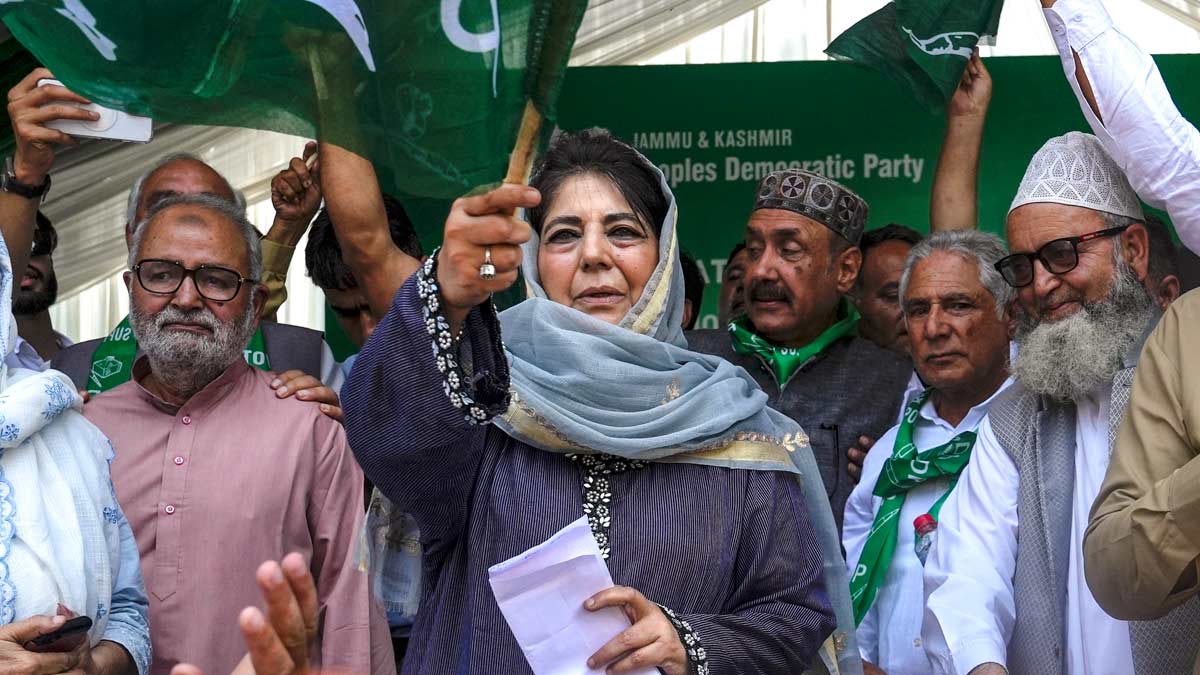Jammu & Kashmir: Statehood uncertainty and NC’s weak push could help PDP reclaim its lost ground
 PDP president Mehbooba Mufti during the party's 26th foundation day celebrations, in Srinagar | PTI
PDP president Mehbooba Mufti during the party's 26th foundation day celebrations, in Srinagar | PTI
On the 26th Foundation Day of the Peoples Democratic Party (PDP), party president Mehbooba Mufti made a direct appeal to Prime Minister Narendra Modi, urging him to shift away from a purely security-driven policy in Jammu and Kashmir and instead focus on political dialogue and reconciliation. She called on the prime minister to use his strong national mandate to rebuild trust with the people of Jammu and Kashmir through empathy and meaningful engagement.
Speaking at a party function in Srinagar, Mehbooba criticised the abrogation of Article 370. She said the move had neither brought peace nor development to the region. “The people are not enemies—they are citizens seeking justice and dignity,” she said. Questioning the Centre’s continued militarised approach, she asked, “How much security is enough?” and pointed out that basic amenities like toilets and clean drinking water are still missing in many schools, while the deployment of troops continues to increase.
This call for dialogue and compassion echoes the core philosophy on which the PDP was founded in 1999 by Mufti Mohammad Sayeed. The party emerged at a time when Kashmir’s politics was dominated by the National Conference (NC) and the Congress to some extent. With its "healing touch" policy, the PDP positioned itself as a people-first party advocating humane governance, engagement with separatists, and demilitarisation. It provided a political entry point for those disillusioned with mainstream politics—particularly supporters of separatist groups like Jamaat-e-Islami—who saw in the PDP a bridge between resistance and participation. The party was often seen as a space between separatism and mainstream.
The party's real breakthrough came in 2000. It formed a coalition government with Congress, and Mufti Mohammad Sayeed became chief minister. PDP’s development work, especially in South Kashmir and its efforts to create a softer security environment earned it public trust. By 2014, the PDP with 28 MLAs in the 87-member assembly became the single largest party in the assembly.
However, the decision to ally with the BJP after the 2014 polls proved politically suicidal. The PDP’s core voters viewed the alliance as a betrayal, and the partnership unravelled amid policy clashes and growing public anger. The mishandling of the 2016 agitation sparked by the killing of popular Hizbul Mujahideen commander, Burhan Wani, alienated the party’s core supporters. The final blow came in 2018 when the BJP pulled out of the coalition and abrogated Article 370 in 2019, downgrading Jammu and Kashmir into two Union Territories.
In the aftermath of Article 370, the PDP was rocked by the desertion of key leaders and grassroots workers. Most of them joined JK Apni Party, allegedly backed by the BJP. The JK Apni Party was founded by former PDP leader and minister Altaf Bukhari, months after the BJP made the Article 370 move.
Desertions and loss of support at the grassroots left Mehbooba with only a few trusted aides. Among them, the young youth leader of the party, Waheed Parra, continued to soldier on. Parra was among the only three PDP MLAs who emerged winners in last year’s assembly elections, the first after Article 370.
Now, as the BJP-led central government continues to refuse to give a timeline for the restoration of statehood, and the Omar Abdullah-led NC government in the Union Territory seems reluctant to forcefully pursue the demand, space may be reopening for the PDP—especially in areas where the party once had a strong presence. In parts of South Kashmir, PDP’s past developmental work, its sympathetic stance toward separatists, and its accommodative political approach still hold memory and meaning for many voters.
Mehbooba’s renewed pitch for dialogue, political dignity, and regional justice may yet help PDP claw its way back from the margins. While the road ahead is uncertain, the current vacuum in opposition politics, combined with growing public frustration, may offer the PDP an opportunity to reconnect with its old base—and shape a new chapter in Kashmir’s complex political story.
India